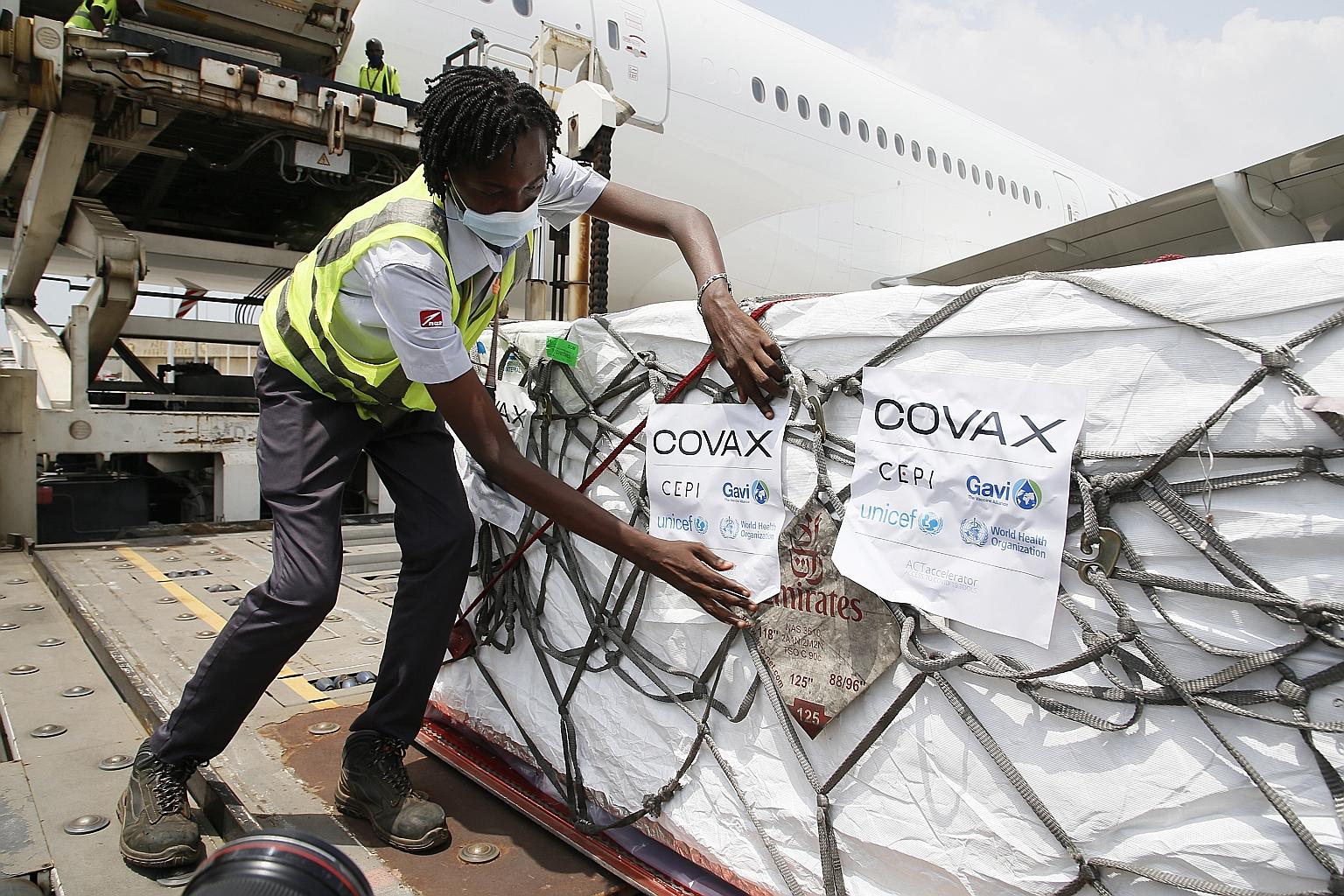Parliament Debate on ministries’ budgets: Foreign Affairs
Singapore playing its part to ensure equitable access to Covid-19 vaccines
Sign up now: Get ST's newsletters delivered to your inbox

Workers in the city of Abidjan last Friday, unloading boxes of the AstraZeneca-Oxford vaccine - the Ivory Coast's first batch of Covid-19 shots received under the Covid-19 Vaccine Global Access (Covax) scheme. Singapore helped to establish the Covax collective purchase mechanism, which sees self-funded members like the Republic allocated a small amount of vaccines, while subsidised shots are allocated to 92 low-and lower-middle-income countries.
PHOTO: EPA-EFE
Singapore is playing a key role in international efforts to combat Covid-19 by ensuring an equitable distribution of vaccines to countries big and small, Foreign Minister Vivian Balakrishnan told Parliament yesterday.
The Republic helped establish the Covid-19 Vaccine Global Access (Covax) collective vaccine purchase mechanism. Under the scheme, self-funded members like Singapore will be allocated a certain small amount of vaccines.
Meanwhile, subsidised vaccines will be allocated to 92 low-and lower-middle-income countries. "On this count, Singapore is a net donor," said Dr Balakrishnan, giving an update on his ministry's recent and upcoming plans.
The Covax facility seeks to procure, equitably allocate and deliver two billion doses of Covid-19 vaccines by the end of this year.
"We must start with the principle that fair and equitable access to vaccines across the globe is essential," said the minister.
"This is not an ideological position. This is a practical proposition, because no one is safe until everyone is safe. And this is especially so for a small, open country like Singapore," he added.
Ms Sylvia Lim (Aljunied GRC) and Mr Chong Kee Hiong (Bishan-Toa Payoh GRC) had asked about Singapore's role in promoting vaccine access in the global community during the debate on the Foreign Ministry's budget.
Dr Balakrishnan highlighted how the pandemic has demonstrated that new levels of partnership between government, civil society and industry can be forged across borders when countries are united around a common purpose.
On top of its role in establishing the vaccine purchase mechanism, Singapore has supported the Covax facility's work by co-chairing the Friends of the Covax Facility group with Switzerland, and committed to contributing US$5 million (S$6.7 million) to Covax to ensure sufficient production of Covid-19 vaccines and access for poorer nations, he said.
"Our quantum took into account the needs of the larger international community and also our status as a tiny city state, but a responsible and contributing member of the international community," he said in reply to Ms Lim, who had also asked how the US$5 million sum was determined.
The minister said it is quite natural for each country to look to secure supplies for itself first amid a crisis. "But we know that the virus knows no borders. Covax's primary value is in supporting wider access to vaccines. Without it, we would all be collectively worse off.
He said that it was Prime Minister Lee Hsien Loong who had introduced the term "vaccine multilateralism" last June.
It has since been acknowledged by the World Health Organisation director-general, and entered the international anti-Covid-19 lexicon, Dr Balakrishnan said.
He noted that amid the shifting and volatile global environment, the work of strengthening Singapore's resilience is inextricably intertwined with the country increasing its relevance to the world.
There are several areas in which this can be done in the light of Covid-19, including in supply chain connectivity, travel arrangements, digital cooperation and fighting climate change.
The world has also seen unprecedented levels of international scientific and medical cooperation, said Dr Balakrishnan.
For instance, China's scientists published the genome of the Sars-CoV-2 virus early on in the pandemic in January last year, a step that paved the way for the development of diagnostic tests all over the world.
There has also been effective cooperation across borders to share research and develop tests, vaccines and treatments, said Dr Balakrishnan.
Still, it will not be easy to make progress on these priorities, the minister noted.
"The world will continue to feel the pandemic's after-effects for several years to come. There will still be great geopolitical and macroeconomic risk for Singapore," he said.
One factor is global debt, which has been rising at unprecedented levels in the years after the 2008 to 2009 global financial crisis.
As governments have rolled out fiscal measures and corporations borrowed to stay afloat during the pandemic, global debt has doubled or even probably quadrupled, and would be unsustainable in the long term even as the measures and borrowing have helped to avert the worst economic consequences in the short term.
The economic impact of Covid-19 has also deepened fault lines globally and led to divisions between countries and within societies, leading to growing political friction and distrust.
The pandemic has also accelerated the downward spiral of United States-China relations, the minister noted, although he still hopes that both powers can find ways to manage their relations through practical cooperation, especially within a rules-based multilateral system.
As Singapore looks beyond the crisis, much remains uncertain, Dr Balakrishnan said. "The waters around us remain turbulent, there will continue to be unexpected currents... that could potentially throw us off course."
But Singapore has demonstrated its resilience as a people and as a country. It has also preserved its relevance and strengthened its reputation as a principled, reliable and credible actor on the international stage, he said.
"This will put us in good stead going forward, as we continue to pursue Singapore's long-term interests... We will emerge stronger in an uncertain world."
Yuen Sin


